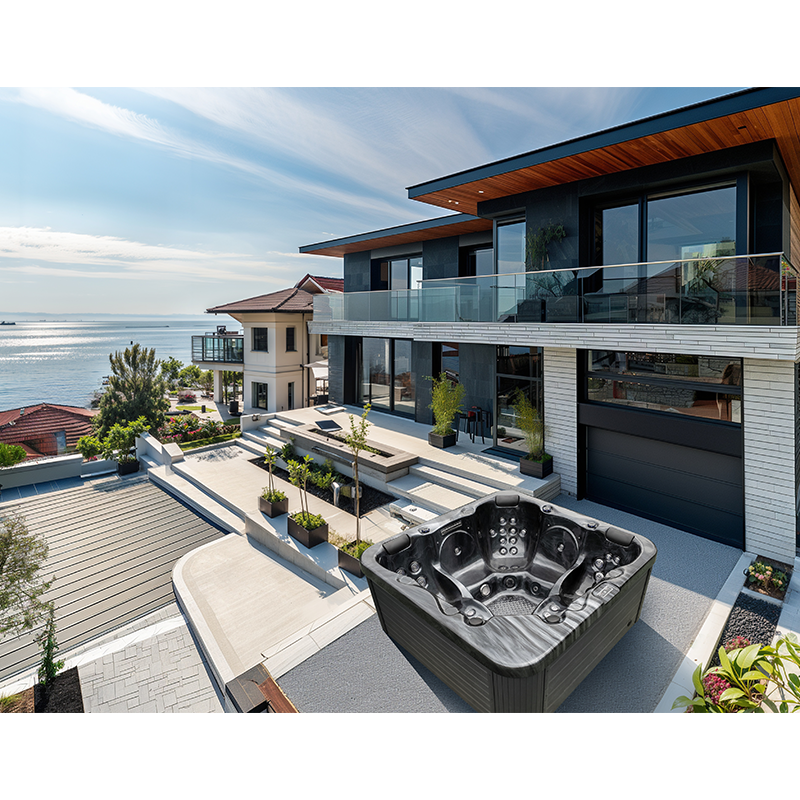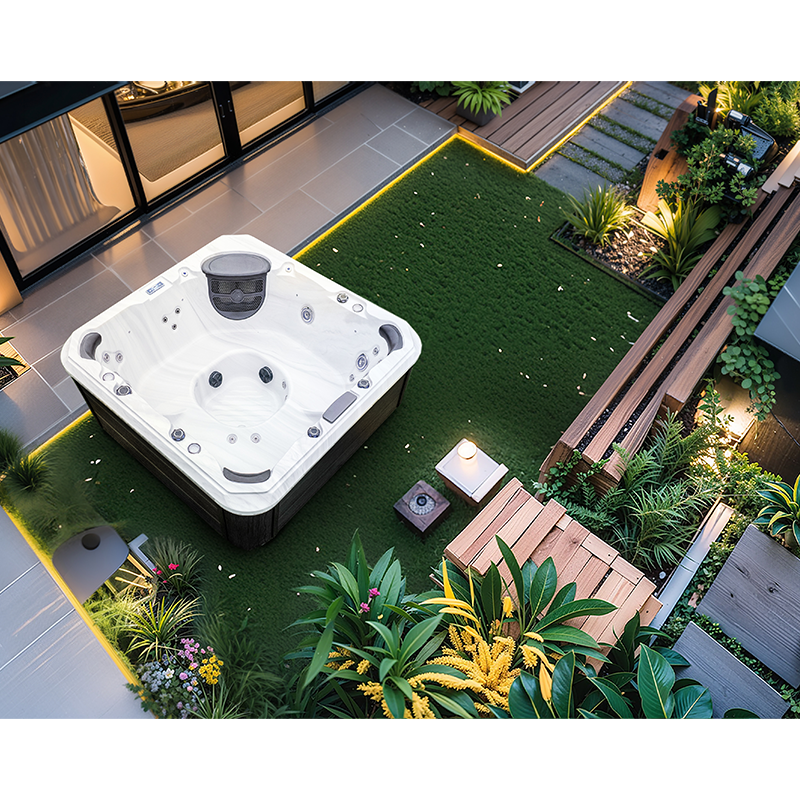
Can I use baking soda to increase the alkalinity of an outdoor hot tub?
2024-11-16 15:35Maintaining the water quality of an outdoor hot bathtub is essential to ensure its longevity and comfort. Alkalinity is an important indicator that affects the balance of water quality, and it plays a vital role in ensuring the health of water quality. When the alkalinity of water is too low, the pH value becomes unstable, and the acidic substances in the water may cause equipment damage and human discomfort. In this case, many users may think of using common household substances to solve the problem, such as baking soda (sodium bicarbonate). Can this common kitchen material be used to increase the alkalinity of a hot tub?
This article will explore the role of baking soda in increasing the alkalinity of outdoor hot tub water, explain its chemical principles, applicability and usage methods, and help you better master water quality management skills in daily maintenance.

What are the chemical properties and functions of baking soda?
Baking soda, chemically known as sodium bicarbonate (NaHCO₃), is a white, fine granular powder that is widely used in cooking, cleaning, and home health care. Sodium bicarbonate is relatively stable in chemical properties and is slightly alkaline when dissolved in water, so it is chemically regarded as a buffer that helps regulate the acid-base balance of water.
The alkalinity of baking soda
When baking soda is dissolved in water, it releases sodium ions (Na⁺) and bicarbonate ions (HCO₃⁻). Bicarbonate ions can combine with hydrogen ions (H⁺) in water to form carbon dioxide (CO₂) and water. In this process, the acidic substances in the water are neutralized and the alkalinity is increased.
This property of baking soda makes it an effective alkalinity enhancer, especially when water quality needs to be adjusted quickly. Compared with other chemicals, sodium bicarbonate reacts more gently, so it can not only increase the alkalinity of water, but also avoid drastic fluctuations in pH.
The relationship between baking soda and alkalinity
Alkalinity is the sum of alkaline substances in water, specifically the concentration of substances such as bicarbonates, carbonates and hydroxides in water. Alkalinity can help offset acidic substances and stabilize pH. When alkalinity is too low, pH is prone to drastic fluctuations, resulting in unstable water quality.
Baking soda is primarily bicarbonate, so it can directly increase the alkalinity of water while having relatively little effect on pH. This makes it a suitable water quality regulator for routine maintenance.

What is the impact of alkalinity on hot tub water quality?
In outdoor hot bathtubs, maintaining the right alkalinity level is an important part of water quality management. Alkalinity not only affects water clarity, but is also directly related to water stability and comfort. Typically, the alkalinity range in a hot tub should be kept between 80 and 120 ppm (parts per million), which prevents the effects of excessive acidity or alkalinity on tub equipment and users.
Effects of low alkalinity
When the alkalinity in a hot tub is too low, the pH of the water becomes extremely unstable and easily disturbed by external factors. Low alkalinity water quality not only causes the pH to drop rapidly, but also causes a series of problems:
● Equipment corrosion: Acidic substances in low alkalinity water can easily corrode metal parts (such as nozzles and pumps), shortening the life of the equipment.
● Turbid water: Water with low alkalinity tends to become turbid, making it difficult to maintain water quality.
● Skin irritation: Acidic water may irritate the skin and eyes, especially when soaking for a long time.
Effects of excessive alkalinity
On the contrary, excessive alkalinity is not an ideal water quality state. Excessive alkalinity will cause the pH value to rise and cause minerals in the water to precipitate and form scale, which will affect the normal operation of the heater and pipes. In addition, high alkalinity water quality will also reduce the effectiveness of disinfectants, making it difficult to completely remove bacteria and microorganisms in the water.
Therefore, it is crucial to keep the alkalinity of hot bathtub water within the appropriate range to ensure the stability of the pH value and avoid equipment damage and user discomfort.

How does baking soda compare to other alkalinity regulators?
Baking soda is not the only substance that can increase the alkalinity of hot tub water. There are other chemicals on the market that are specifically designed for water quality maintenance, such as alkalinity increasers. These products usually contain sodium carbonate (Na₂CO₃), also known as soda ash.
Differences between baking soda and alkalinity enhancers
Although both sodium bicarbonate (baking soda) and sodium carbonate (alkalinity enhancers) can increase alkalinity, their chemical properties are different:
● Baking soda (sodium bicarbonate): Gently increases the alkalinity in water with relatively little effect on pH. Baking soda's buffering effect can effectively stabilize water quality, but a larger amount is required to significantly increase alkalinity.
● Alkalinity enhancers (sodium carbonate): In contrast, sodium carbonate is more alkaline and can increase the alkalinity of water more quickly, but it may also cause a significant increase in pH. Therefore, when using sodium carbonate, it is necessary to closely monitor changes in pH to avoid water imbalance.
Advantages of baking soda
Baking soda has several significant advantages over alkalinity enhancers:
● Affordable: Baking soda is a very cheap and easily available household material that almost every household will have in stock, so there is no need to purchase special water conditioning products.
● Mild effect: Baking soda has a relatively mild effect, so it can increase alkalinity without drastically changing pH, making it suitable for daily maintenance use.
Therefore, using baking soda is a convenient, economical, and effective option when alkalinity only needs to be fine-tuned.
How to use baking soda to increase the alkalinity of a hot tub?
When deciding to use baking soda to increase the alkalinity of your outdoor hot tub, the key is to master the correct amount and method to avoid over-adjustment. Here are some steps to help you use baking soda scientifically:
Measure the current alkalinity
First, measure the current alkalinity level in your hot bathtub using a water quality test kit or test strips. Ideally, alkalinity should be maintained between 80 and 120 ppm. If the test result is below this range, you can consider adding baking soda.
Determine the amount of baking soda to use
Generally, adding about 170 grams of baking soda to every 1000 liters of water can increase the alkalinity by 10 ppm. Therefore, you can calculate the amount of baking soda required based on the volume of the water body and the alkalinity you need to increase. For example, if your hot tub has a volume of 2000 liters and needs to increase the alkalinity by 20 ppm, you will need to add about 680 grams of baking soda.
Add baking soda gradually
Add the calculated amount of baking soda over several times rather than pouring it all at once. This allows for better control over changes in water quality and avoids sudden pH fluctuations. After each addition, wait for the water to circulate for a period of time (usually 30 minutes to an hour), then test the water again to ensure that both alkalinity and pH are within the ideal range.
Monitor pH
Although baking soda has a small effect on pH, it is still necessary to closely monitor pH during use. If you notice a significant increase in pH, you may consider using a pH reducer to restore the water balance.
Regular maintenance
Alkalinity adjustment is not a one-time task. Due to the frequent exposure and frequent use of outdoor hot bathtubs, the alkalinity of water will fluctuate over time. Therefore, regular checking and maintenance of alkalinity is key to ensuring healthy water quality.

What are the precautions for using baking soda?
Although baking soda is a safe and effective alkalinity enhancer, there are still some precautions to be taken during use to ensure long-term stability and safety of water quality.
Avoid overdosing
Overdosing with baking soda may cause alkalinity to become too high, which in turn affects pH and water clarity. If the alkalinity in the water is too high, it may cause mineral precipitation, scale formation, and damage to the equipment. Therefore, when using it, it must be adjusted gradually according to the actual situation of the water body.
Use with other water conditioners
If other water conditioners such as chlorine or bromine are used at the same time, it is recommended to closely observe the interaction of these chemicals with baking soda to ensure that they do not affect the balance of the water. In some cases, using too many chemicals may cause unstable water quality.
Avoid mixing with strong acids
Although baking soda is effective in alkalinity adjustment, it may cause unwanted chemical reactions when mixed with strong acids. Therefore, avoid adding strong acids or strong alkalinity to the water at the same time to prevent drastic changes in water quality.
